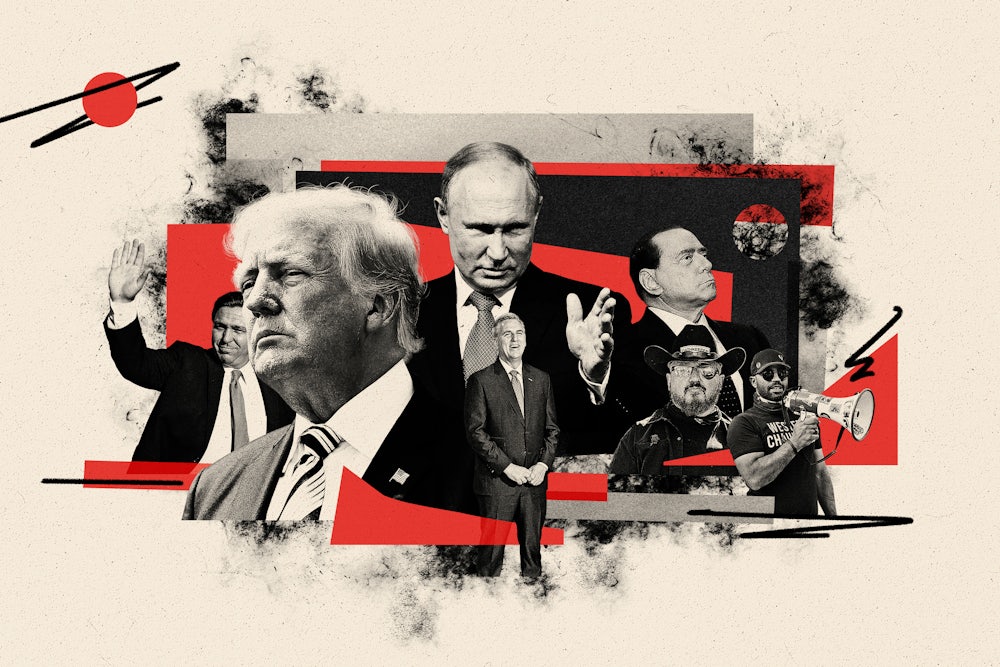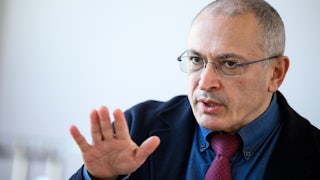What happens to a bipartisan democracy when one of the two parties turns toward autocracy? This is the drama we are now living through in the United States. Half the political class operates within a democratic framework, while the other half embraces extremist politics. From support for the January 6 assault on the Capitol, to the assault on free and fair elections, the GOP has jettisoned the rituals, norms, and values of democracy. It has become an authoritarian party that considers violence and propaganda legitimate tools for the exercise of power.
This might sound hyperbolic to some. After all, the United States remains an open society, and in November 2020, Americans voted former President Donald Trump out of office. Trump’s attempt to block the transfer of power to Joe Biden did not succeed. As of the end of February, almost 800 people had been charged in the January 6 insurrection. Enrique Tarrio, former head of the extremist Proud Boys group, has been indicted, and the leader of the extremist group Oath Keepers, Stewart Rhodes, has been arrested and charged with seditious conspiracy.
Yet we must be clear about what is at stake and the scope of the challenges we face. The GOP and allied media are continuing Trump’s agenda of democratic destruction. Not only are Republican-governed states like Florida and Texas becoming laboratories of American autocracy, but the Republican Party is reshaping its political culture to support illiberal rule at the national level if the Republicans recapture the White House in 2024.
Trump was able to radicalize the GOP, create an army of loyal grassroots insurgents, and lead both into battle against American democracy because he was an autocratic, not democratic, president. He differed from past heads of state of either party in having zero interest in public welfare or consensus politics. “If you don’t dominate, you’re wasting your time,” he told governors about responding to the 2020 Black Lives Matter protests, summing up his approach to governance.
The U.S. presidency was just a means to an end for Trump, who exercised a version of “personalist rule” in which the financial, legal, and other personal interests of the leader prevail over national ones in shaping domestic and foreign policy. In personalist rule, public office becomes a vehicle for private enrichment for the leader and his allies. (Before the onset of the pandemic in 2020 curtailed his traveling, Trump spent an astonishing one-third of his time in office traveling to promote his business brand.) Personality cults and alternate realities built through continuous disinformation keep people loyal to him, and the hatred he sows polarizes society, generating suspicion rather than solidarity among citizens.
Personalist rule typically develops within autocracies. The kind of power wielded by Russian President Vladimir Putin, who built a power vertical that leaves him untouchable (at least before his reckless invasion of Ukraine) and has reportedly made him the richest individual in the world, is one example. Yet the personalization of power can also manifest in fragile democracies in which the executive is able to exert sufficient pressure on institutions to bend them to his own purposes, as Italian Prime Minister Silvio Berlusconi did with the judiciary and Parliament during his two terms of the 2000s.
Personalist leaders are corrupt leaders. Like Berlusconi and Putin, Trump came into office under investigation. That’s why the time and energies of the state and the ruling party are diverted to defending them from accusations of wrongdoing and avenging their supposed persecutions by their enemies. (The Republican National Committee paying some of Trump’s personal legal expenses is an example.) Self-protection of the leader also dictates the creation of inner sanctums composed of family members and flatterers. They keep the leader’s secrets and protect him from truths he does not want to hear.
Over time, the political system increasingly reflects the personal values and mission of the personalist leader—and that usually means the institutionalization of thievery, lying, and repression. One sign of this influence is the emergence within the system of elite imitators who compete to embody the leader’s way of governing. Secretary of State Mike Pompeo’s boast about “swagger” being the new U.S. approach to diplomacy is one example. Florida Governor Ron DeSantis’s emergence as a mini-Trump, who imitates the former president’s hand gestures and makes his state into an illiberal stronghold, is another. Understanding these authoritarian dynamics, and how they have affected the Republican Party, is key to anticipating what the United States could become if the GOP retakes the White House in 2024.
Since the start of Italian fascist rule a century ago, personalist leaders have come to power by striking authoritarian bargains whereby elites, motivated by the preservation of their economic privileges, back the leader’s removal of rights from citizens. Certainly, the GOP was ready for an openly autocratic leader. A 2012 assessment by the political scientists Norman J. Ornstein and Thomas E. Mann captured the growth of an anti-democratic ethos that would intensify with the absorption of Tea Party energies:
The GOP has become an insurgent outlier in U.S. politics. It is ideologically extreme; scornful of compromise; unmoved by conventional understanding of facts, evidence and science; and dismissive of the legitimacy of its political opposition.
Trump had thought about running for president for years. In 2011, he had tested the waters as an openly racist candidate, spreading a conspiracy theory that claimed that President Barack Obama was born in Kenya and thus ineligible to govern. The stars aligned for the 2016 election cycle. The uptick in refugees and migrants, the danger of a female presidential candidate, Hillary Clinton, and the affront of eight years of Obama’s rule created the right degree of resentment against the strongman’s usual enemies—women, racial and ethnic minorities, immigrants—and a sense that traditional political offerings were insufficient to meet the threat.
Up stepped Trump to shock the political landscape, hewing to strongman traditions that started with the fascists. He created a movement and big-tent constituency built on normalizing extremism and communicated with his followers in ways that seemed to them authentic and fresh.
During the 2016 election, Trump’s openly authoritarian positions electrified the Republican base and GOP lawmakers. Now, political opponents not only had no legitimacy, but should be imprisoned—or worse. “Lock her up!” became the favorite chant at Trump rallies. Al Baldasaro, a GOP member of the New Hampshire House of Representatives, and others called for Hillary Clinton to be executed by firing squad. Trump suggested that “Second Amendment People” could act against her.
Every strongman manages elites through relationships of fear and complicity. Trump’s personal qualities and talents proved ideal to further corrupt and subjugate the GOP. He is not just a highly skilled propagandist, but also the embodiment of the man who gets away with everything—like fraud, tax evasion, and sexual assault, to mention only his publicly known portfolio of criminal allegations. As corruption expert Casey Michel observes, Trump is the first Western leader to emerge from the “kleptocratic services industry,” via a real estate business that was long suspected of laundering money for oligarchs, Mafiosi, and more. The impact of having someone in the White House who conducts himself like a mob boss cannot be overstated in terms of legitimating lawless behavior, as well as extremist and racist beliefs.
Nor does the history of the U.S. presidency suffice to explain the authoritarian-style discipline Trump imposed on the GOP. Over time, parties that serve personalist leaders become hollowed out and devoid of ideals other than holding power. Loyalty to the leader, rather than competence, becomes the most desirable political quality for party leadership. The decision of the GOP to forgo announcing a party platform for the 2020 election season beyond its support of Trump is symptomatic.
So is the erasure of any independent spark in party luminaries. There’s no trace today of the Kevin McCarthy (then House majority leader) who worried in a June 2016 conversation with then-House Speaker Paul Ryan that Trump was on Putin’s payroll. In his place is a party apparatchik (now House minority leader) and keeper of the personality cult flame who voted in Congress 97.3 percent of the time in accordance with Trump’s wishes.
With each new challenge to his authority, Trump tightened the vise further. By 2020, after he weathered impeachment by the House (and acquittal by the Senate), the right to air dissenting views within the GOP had also diminished. By his second impeachment trial in February 2021, in the wake of January 6, questioning the leader cult had become downright dangerous. “Our expectation is that someone may try to kill us,” said GOP Representative Peter Meijer of Michigan, who voted to impeach Trump, explaining why he was buying body armor.
Personalist rule is also one frame among many that explains January 6, which was a milestone on America’s path away from democracy, and which perfectly expresses the far-right’s direct-action philosophy and scorn for deliberation and the rule of law. Seen in the context of authoritarian history, it was a coup attempt (technically, a self-coup) by a sitting president who sought to remain in power illegally.
Yet January 6 was also a last-ditch leader-rescue operation executed by Trump’s faithful followers. Tellingly, 57 local and state GOP officials attended the rally that preceded the assault on the Capitol. The propaganda film shown there at the conclusion of the violence-inciting speeches paid homage to Trump’s personality cult. A close-up of his face lingered on-screen as his supporters streamed to the Capitol, becoming the latest people to commit violence on the strongman’s behalf.
January 6 has now become a foundational event of a new GOP that defines itself around violence and lawlessness, both framed as the patriotic protection of American freedom. So, it’s logical that the party would actively court individuals who participated in the Capitol assault to populate its leadership ranks.
To date, at least 30 Republicans who either were at the Capitol that day or breached it are now running for office, and at least 11 of them enjoy Trump’s endorsement. They have already proved to have the qualities most important to today’s GOP: a willingness to endorse and commit violence and make the party’s falsehoods, above all the Big Lie that Trump won the 2020 election, a springboard for action.
Ryan Kelley, who is running for governor of Michigan, has the proper credentials to thrive in a party now dedicated to illegal methods of gaining and keeping power. He’s co-founder of the American Patriot Council, which came to public attention in 2020 when the group organized a rally after which armed militia members breached the state Capitol, occupying the upper gallery. Kelley’s claim that some people will vote for him because he participated in January 6, not in spite of it, is not unfounded.
Corruption and radicalization are processes, and authoritarian states have long known how to accelerate them by making government a refuge for those who don’t have to learn to be lawless. In the Third Reich, the Nazis often hired individuals with handy criminal skills to hasten the contagion effect. Anton Karl, convicted for theft and embezzlement during the Weimar Republic, became head of the Nazi Labor Front’s construction department, known for his skillful use of bribery to gain contracts.
The accolades and job offers given by GOP lawmakers to Kyle Rittenhouse, whose valued skills revolve around him killing people during a protest against police brutality in Kenosha, Wisconsin, and then being acquitted for the crime, are another sign.
So is the matter-of-fact statement by two-term North Carolina state Representative Mike Clampitt, an Oath Keepers member, that he considers his government service as the way he participates in the Oath Keepers and furthers their cause. For Clampitt, serving the GOP is the straightest path to overthrowing the institutions and values of the enemy—the federal government.
It is hard to overstate the danger of a party that is preparing for illiberal rule at the national level by normalizing criminality. Whether or not Trump runs for office in 2024, his four years as a personalist leader, and the force of his example, have been absorbed into the GOP’s DNA.






